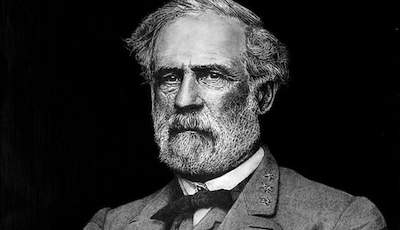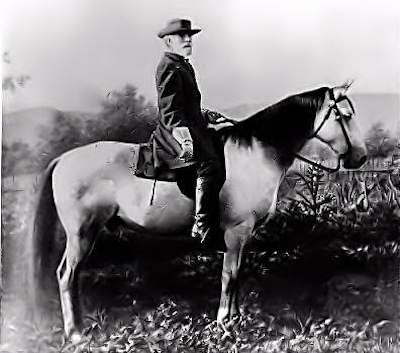
By Calvin E. Johnson Jr. —— Bio and Archives January 19, 2014
Comments | Print This | Subscribe | Email Us

“I won't ever stop loving you my Dixie till they put me in the ground. And the last words they probably hear from me are God bless Robert E Lee.”What was General Robert E. Lee’s favorite war horse? See answer at end of article. January is a historic month of history when students, teachers, parents, Joe and Jane America and the world will hear much praise in memorial tribute to the Civil Rights leader and Baptist Pastor Dr. Martin Luther King, Jr. who was born on the 15th day of January, in the year of our Lord, 1929 in Atlanta, Georgia…. But, shouldn’t local, state and national news institutions also give fair and equal treatment and coverage to those who will remember the birthdays of General’s Stonewall Jackson and Robert E. Lee who were also born during the month of January?
“Here I greet you in the shadow of the statue of your Commander, General Robert E. Lee. You and he left us memories which are part of the memories bequeathed to the entire nation by all the Americans who fought in the War Between the States.”Who was Robert E. Lee? Robert E. Lee was born on Jan. 19, 1807, at “Stratford” in Westmoreland County, Virginia. The winter was cold and the fireplaces were little help for Robert's mother, Ann Hill (Carter) Lee, who suffered from a severe cold. Ann Lee named her son "Robert Edward" after her two brothers. Lee was educated at the schools of Alexandria, Va., and also received an appointment to the United States Military Academy at West Point in New York in 1825. He graduated in 1829, second in his class and without a single demerit. Robert E. Lee's first assignment was to Cockspur Island, Georgia, to supervise the construction of Fort Pulaski. Robert E. Lee wed Mary Anna Randolph Custis in June 1831. Robert and Mary had grown up together. Mary was the daughter of George Washington Parke Custis, the grandson of Martha Washington and the adopted son of George Washington. In 1836, Lee was appointed to first lieutenant. In 1838, with the rank of captain, Lee fought valiantly in the War with Mexico and was wounded at the Battle of Chapultepec. He was appointed superintendent of West Point in 1852 and is considered one of the best superintendents in that institution's history. General Winfield Scott offered Robert E. Lee command of the Union Army in 1861, but he refused. Lee would command the legendary Army of Northern Virginia for the South during the War Between the States. The answer to the question of what was Lee’s beloved war horse is “Traveller” who is buried near Robert E. Lee and his family at Washington and Lee University in Lexington, Virginia. Do our schools teach the young folks about Robert E. Lee and his farewell address to the troops?
Robert E. Lee, Farewell to the Army of Northern Virginia Headquarters Army of Northern Virginia Appomattox Courthouse, April 10, 1865 (General Orders No. 9) After four years' arduous service, marked by unsurpassed courage and fortitude, the Army of Northern Virginia has been compelled to yield to overwhelming numbers and resources. I need not tell the survivors of so many hard fought battles who have remained steadfast to the last, that I have consented to this result from no distrust of them, but feeling that valor and devotion could accomplish nothing that could compensate for the loss which would have attended the continuation of the contest, I have determined to avoid the useless sacrifice of those whose past services have endeared them to their countrymen. You will take with you the satisfaction that proceeds from the consciousness of duty faithfully performed, and I earnestly pray that a merciful God may extend to you His blessing and protection. With an increasing admiration of your constancy and devotion to your country, and a grateful remembrance of your kind and generous consideration of myself, I bid you an affectionate farewell. Robert E. Lee GeneralLet’s not forget our heroes!

A native of Georgia, Calvin Johnson, Chairman of the National and Georgia Division, Sons of Confederate Veterans, Confederate Veterans Confederate History and Heritage Month Program
He is the author of the book “When America Stood for God, Family and Country.”